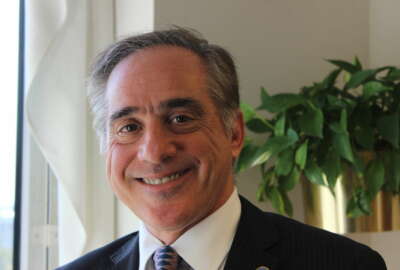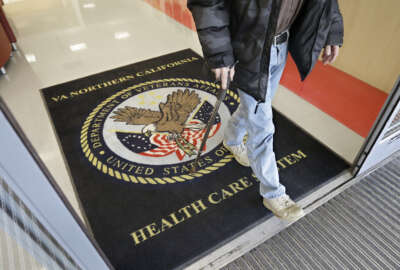
Congress, VA debate: Who should schedule veterans’ appointments?
Congress is beginning to get a clearer picture of the Veterans Affairs Department's new Choice Program, which lets veterans access private sector community care...
Congress is getting a clearer picture now of the Veterans Affairs Department’s vision to improve its community health care program. But it’s largely skeptical that VA can effectively manage such a vast overhaul of the program, and it questioned the department’s continued role in scheduling veterans’ appointments.
According to the VA’s proposal, the new Choice Program would let veterans choose whether they want to access a VA medical center or a private sector provider in the community for care. If the veteran chooses community care, he or she can pick a VA-approved provider from the network list.
The VA organized its provider networks into three tiers:
Tier 1: VA medical centers, including Defense Department, Indian Health Service, Tribal health programs and federally qualified health center providers
Tier 2: Top quality community providers, which the VA will rate using a series of performance metrics
Tier 3: Community providers that meet the VA’s standard criteria
Yet members were concerned and confused by the VA’s three-tiered system and questioned why the department needed to group its care options in the first place.
“The way we present it in the plan is just a way to organize providers,” Baligh Yehia, the VA’s assistant deputy undersecretary for health for community care, told the House Veterans Affairs Health Subcommittee at a March 22 hearing on the Choice Program. “From the veterans’ perspective, they will not see tiers. They will see a directory of providers, and those providers, as best as possible, will have information about where they are, what specialty they are, their affiliations, their quality and their satisfaction.”
Under the proposal, the VA will also schedule most department and private care appointments for veterans.
“We want to be more [of] the face of customer service and scheduling,” Yehia said. “That could mean just saying to the veteran, ‘You’re eligible for community care, here’s the options. Do you want to schedule your own appointment?’ We would be more of the ones that would be having that conversation, rather than the contractors.”
But that piece of the proposal scares several members of the committee.
“The whole reason for the Choice Program was that there was a scandal in the VA on scheduling,” Rep. Mike Coffman (R-Colo.) said. “That the level of corruption, systemic corruption across the VA in scheduling [was] driven by cash bonuses in order to bring down the wait times. They created these secret lists. And now what you want to do and what the VA wants to do is … give it back to those same people.”
Yehia said the department heard from many veterans about the scheduling issue, who told the VA they were tired of dealing with a “middleman” when they wanted to make an appointment. Under the current Choice Program, a private contractor calls the veteran to schedule his or her +appointment with a private community care provider — after the VA clears the veteran for eligibility. The department handles appointments for veterans at VA medical facilities.
“[Are veterans] going to be able to call and get an appointment for themselves?” House VA Health Subcommittee Chairman Dan Benishek (R-Mich.) asked. “It seems to me that a huge part of the problem in getting an appointment is that somebody is making the appointment for the veteran.”
Some veterans with certain medical conditions or social circumstances want the VA’s help to coordinate their appointments, Yehia said. But he acknowledged that other veterans want to schedule their own.
“We want to make sure we can connect the dots,” Yehia said. “We don’t want to just say, ‘Here, make your own appointments.’ We want to figure out a way to get that information back, so when they do come back to the VA if they have to see another doctor, we have the clinical information from that community provider.”
But for many members of Congress, the VA’s community care plan is too complicated and has too many layers of bureaucracy.
For example, several members wanted to know why a VA or private doctor couldn’t simply issue referrals to veterans who need to see another specialist, rather than repeating the long scheduling process with the department.
“The veteran needs to be in charge of his or her health care, and we as providers, both the VA and the community, need to provide that care for them,” Rep. David Roe (R-Tenn.) said.
But as the department reminded Congress, the VA has systems in place to make sure veterans are eligible for care and its providers get paid.
“VA’s community care network is not a health insurance plan,” Yehia said. “It’s an integrated system with the direct care and the community.”
Lessons learned
Congress passed the Veterans Access, Choice and Accountability Act as a temporary fix to several longstanding problems with scheduling delays at the VA.
Now, Congress is poised to fix and refine pieces of the bill that aren’t working.
“The sooner we can make this permanent, the sooner we can make those relationships more long term for the veterans, as well as the providers,” Rep. Tim Huelskamp (R-Kan.) said.
The department has publicly said it for months: VA alone cannot meet all of veterans’ health care demands. It first pitched its plan to transform the current Choice program to Congress in October.
Since then, VA is meeting with providers to listen to their concerns with the Choice program. The department received 600 responses from private sector providers and 300 from VA health care professionals, which VA is using to inform new draft requests for proposal, Yehia said.
The VA was forced to hastily implement pieces of the current program, because Congress mandated the department stand it up within 90 days of passing the Choice Act in 2014. The timeline also put pressures on the private care providers, particularly in their ability to quickly match veterans with appointments.
“Part of the challenge in the scheduling space was we stood this program up in a little over 30 days, because you were responding to a crisis — and appropriately so — with the right kind of intensity,” said David McIntyre, president and CEO of TriWest Healthcare Alliance, a current VA private provider network.
The Senate VA Committee is also working on an overhaul to the Choice Act and the Veterans Choice Program, which would also include more changes to the disability appeals process and new accountability provisions for the department’s senior executive core.
Copyright © 2025 Federal News Network. All rights reserved. This website is not intended for users located within the European Economic Area.
Nicole Ogrysko is a reporter for Federal News Network focusing on the federal workforce and federal pay and benefits.
Follow @nogryskoWFED
Related Stories

VA pitches ‘fundamental shift’ in veterans’ health care to Congress





